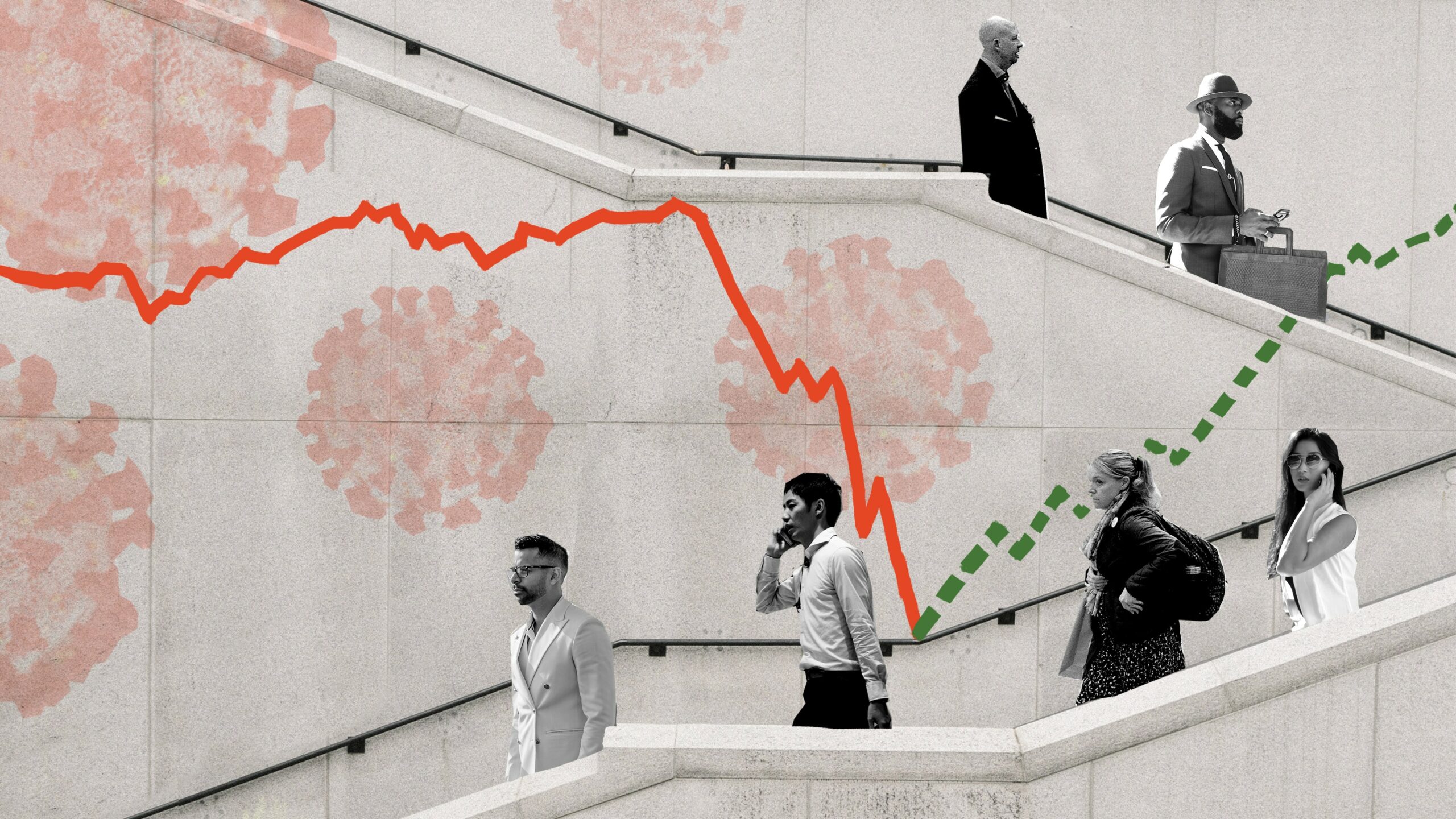Sandra Peter and Kai Riemer

Taxes and taxation on Corona Business Insights
Working from home and big tech gains spark debate about taxes and taxation as we look to tackle the economic effects of the pandemic.
As COVID-19 sets out to change the world forever, join Sandra Peter and Kai Riemer as they think about what’s to come in the future of business.
Shownotes
Deutsche Bank proposes a 5% tax for people still working from home after the pandemic
Deutsche Bank’s “What we must do to rebuild” research
There should be a windfall tax on big tech in the 2020s
COVID-19 is increasing poverty – but also support for tax rises to tackle it
Our previous discussion of universal basic income on Corona Business Insights
This episode is part of a podcast series covering what COVID-19 will mean for the business world, where we look at the impact on the economy, businesses, industries, workers and society. This is part of our ongoing coverage of the impact of COVID-19 on the future of business.
Follow the show on Apple Podcasts, Spotify, Overcast, Google Podcasts, Pocket Casts or wherever you get your podcasts. You can follow Sydney Business Insights on Flipboard, LinkedIn, Twitter and WeChat to keep updated with our latest insights.
Send us your news ideas to sbi@sydney.edu.au.
Dr Sandra Peter is the Director of Sydney Executive Plus at the University of Sydney Business School. Her research and practice focuses on engaging with the future in productive ways, and the impact of emerging technologies on business and society.
Kai Riemer is Professor of Information Technology and Organisation, and Director of Sydney Executive Plus at the University of Sydney Business School. Kai's research interest is in Disruptive Technologies, Enterprise Social Media, Virtual Work, Collaborative Technologies and the Philosophy of Technology.
Share
We believe in open and honest access to knowledge. We use a Creative Commons Attribution NoDerivatives licence for our articles and podcasts, so you can republish them for free, online or in print.
Transcript
Intro From The University of Sydney Business School, this is Sydney Business Insights.
Sandra And this is Corona Business Insights. I'm Sandra Peter.
Kai And I'm Kai Riemer.
Sandra And we're back unpacking the impact of COVID-19 on business, the economy, industry, government, workers and society, and looking at the effects of the pandemic.
Kai And this podcast is part of a larger initiative by The University of Sydney Business School, you can find our COVID business impact dashboard online at sbi.sydney.edu.au/coronavirus.
Sandra And today we're having a quick look at taxes and taxation during and after the pandemic.
Kai The pandemic has quite fundamentally disrupted the way we work, it has had tremendous impact on businesses, there have been some businesses that had to close up shop, there have been businesses that had their economic activity reduced and there have been others that have been huge beneficiaries from the move to digital work, to online and the same is true for people and their professions.
Sandra And around the world there seems to be agreement on the fact that governments have the right and the obligation to step in, and both support workers and businesses in trying to recover from the effects of the pandemic.
Kai And the focus in recent weeks and months has been on the aid side of things. We've had lots of programmes like JobSeeker, JobKeeper, huge programmes to keep people in employment, schemes to help businesses in need. But less focus has been on the income side of things, how governments will end up paying for these aid programmes.
Sandra One of the levers that governments have, as we've said, is taxation. So we want to look at a few very different ways in which people around the world have started to think about taxation. And the first one we want to discuss briefly is the 5% tax that has been proposed in Germany. This comes via research done by Deutsche Bank, where the suggestion is to impose an additional 5% tax on workers who choose to work from home when they are no longer forced to do so by government or by pandemic and health restrictions.
Kai And this would be taxed at the source. So it would be corporations who would pay 5% on top of a worker’s salary for those workers who are allowed to work from home after the pandemic has ended. So we're not talking about taxation during lockdown, but for those companies that change their practices, and let workers work from home, predominantly on a permanent basis.
Sandra So the idea would be to use the funds that are raised this way to subsidise lower-paid workers who are unable to work remotely, and people who suffer income loss after the pandemic. And the idea here was that an individual worker contributes quite a lot to the economy in their day-to-day life as they go about doing their jobs in what might be a city office. This would be things like the clothes that they would purchase to use at the office or any dry cleaning they might do, their train tickets or their bus tickets or their parking that they would need to use to get to their job. That would be their morning coffee at the coffee shop or the lunch that they take during their lunch break. But also thinking about the jobs that office work enables as a by-product, things like security guards or cleaners at office buildings.
Kai But also taking account of the fact that those workers now save the cost of consuming all these services and have the privilege of working from home. And the fairness aspect is that they would be able to contribute to the economy by way of redistributing some of those savings to those most in need. And to those missing out on the proceeds of those services that are now reduced.
Sandra So on the one hand, you have people arguing that workers are part of an economic ecosystem and the way we think about jobs and taxation is built on a certain understanding of this ecosystem. And when people stop going to the office, they contribute less to the infrastructure of the economy while still receiving the benefits. Whilst on the other hand, people who are likely to oppose such tax measures would say that any engagement in this economic ecosystem should be a personal choice and people should not be penalised for choosing not to take part in this system.
Kai And some of the other objections come from the fact around transport for example, where it has been argued that working from home is good because it reduces congestion, it is good for the environment. It reduces overcrowding on trains, it reduces overcrowding on roads, which means less cost to maintain roads, for example. But on the other hand, of course, we can make the income argument, less people on trains mean less ticket sales, less contributing to running the system, which could potentially result in cutting services, in people losing their jobs. In Australia, many of the motorways are built in public-private partnerships. So there would be lost income from road tolls from people not driving to the office. So it really depends on how these systems are built and financed, for example, whether the effect would be positive or negative.
Sandra And of course, transport is only one aspect of the problem. As we've discussed, you have huge empty office buildings that will continue to remain empty. Gartner says more than 80% of companies are having plans to have at least part of their staff work remotely forever. And we've seen companies like Twitter telling employees that they never have to come back to work, in addition to things like restaurants, dry cleaning services, and so on and so forth.
Kai But there are also other interesting proposals that are being floated at the moment for how taxation can help with some of the fallout from COVID-19. An interesting proposal comes from Greece.
Sandra Greece is expected to vote through legislation in the next couple of weeks that will come into force next year, that would slash income taxes for remote workers from abroad trying to encourage people to move back to Greece. Greece has experienced one of the worst brain drains in Europe, as in the fallout from the financial crisis workers have moved overseas in search of jobs and better opportunities. So the proposed change to taxation would mean that anyone moving to Greece starting next year, will not have to pay income tax on half their salary for the next seven years, whether they work for a company or whether they're self-employed.
Kai And so if you think about it, it operates at a different scale, but it is a similar kind of argument where governments are using tax to try and encourage people to move their economic activity, in this case not from the home back to the city, but from abroad back to the country to make a positive contribution to the economic system of Greece. They're prepared to reduce tax on salary by half but will then benefit from these people being back in the country contributing to what has been an ailing economy pre-COVID and use this to revitalise also in terms of the skills that people bring back. You talked about the brain drain, which has hit Greece quite hard historically, in the wake of the global financial crisis, the austerity measures by the European Union, but also during COVID. So, an interesting measure to bring back that economic activity.
Sandra And the last tax conversation we want to bring up has to do not with individuals, but with organisations. It has been repeatedly pointed out that the biggest winners from the pandemic have been companies like Amazon, or Apple or Facebook and Google, tech companies which have all seen both their profits soar over the last year, but also their valuations go through the roof.
Kai And so here, an argument is being made analogue to how certain professions that have been hit hard by COVID should be subsidised by those who are privileged and can work from home, whereby companies and sectors that have been hit hard by the pandemic, through no fault of their own, which are being subsidised and helped by the government should be supported by those who, again, through no doing of their own have been huge beneficiaries from the pandemic. So the idea is to tax those extra windfalls from the pandemic, and redistribute some of that extra corporate wealth, so to speak, to those who have been suffering.
Sandra And for this one, there would be historic precedence. In the UK, there was a windfall tax imposed on privatised utilities back in the 1990s. And the argument is that now again, big tech has been rewarded by circumstances that were not of their own making, hence again, there could be a special levy that could be applied as a percentage of their gains that could compensate those in the economy who have suffered from the pandemic.
Kai And we know that it has been notoriously difficult to tax big tech companies in single jurisdictions, but the hope is that the pandemic acts as an impetus to increase the willingness to find new ways of taxing these companies, not just at a national level, but at a pan-national level.
Sandra And our three taxation stories are of course meant to spark debate around a series of important topics that have to do with how we think about who gained and who lost during the pandemic, and how we can rethink what we prioritise in an economy going forward.
Kai And tax of course, has always been used as a way to incentivize or disincentivize certain behaviours in society, to bring about certain behaviours that are in the interest of society at large. But in this case, of course, it's unprecedented circumstances, and it forces us to rethink what we do want to incentivize going forward as society changes off the back of this pandemic.
Sandra But that's all we have time for today.
Kai Thanks for listening.
Sandra Thanks for listening
Outro From The University of Sydney Business School this was Corona Business Insights, the podcast that explores the future of business in the wake of the global pandemic.
Close transcript






